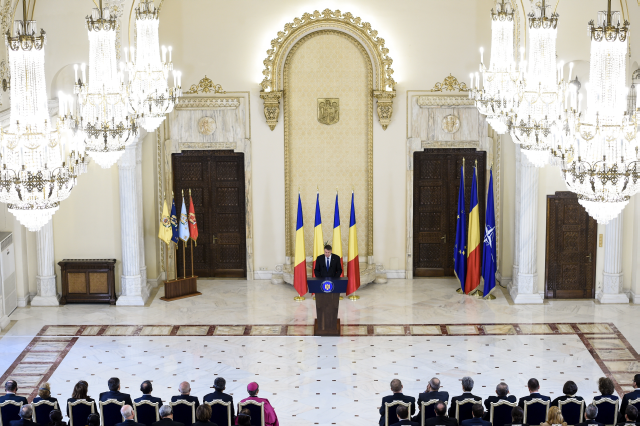Romania’s foreign policy
President Klaus Iohannis outlines the major goals of Romanias foreign policy.

România Internațional, 30.01.2015, 13:57
In his first meeting with the foreign ambassadors in Bucharest, president Klaus Iohannis presented the main goals of his country’s foreign policy. He underlined that Romania’s joining the Schengen passport-free area and the adoption of the euro are the major goals of his term in office. Iohannis told ambassadors that Romania meets the Schengen accession requirements and that the country’s European partners must be fair in their assessment and not change their views according to transient interests. Klaus Iohannis:
“Romania’s complete Europeanisation is a central goal of my term in office. This entails the continuation of the process of European integration through accession to the Schengen area and the adoption of the euro. Romania’s place is in Schengen, as a member state with equal and full rights. We meet all Schengen accession requirements. Any doubts in this respect are motivated by political considerations.”
Romania’s strategic partnership with the United States is another key element of the country’s foreign policy, said president Klaus Iohannis. He stood for a dynamic continuation of the political dialogue and cooperation with Washington. Iohannis also emphasised that the threats to the security of the wider Black Sea region enhances Romania’s strategic role in promoting peace and security on the eastern border of both the European Union and NATO. He insisted that the European Union is the strongest guarantee for peace and stability and called for the improvement of NATO’s prediction capacity given the crisis in the neighbouring Ukraine and the ever-changing security situation.
Speaking about Romania’s relationship with the Russian Federation, Klaus Iohannis said it is affected by the Ukrainian crisis and that a resumption of constructive dialogue depends on Moscow’s compliance with the principles of international law. President Iohannis reiterated his country’s support for the European future of the Republic of Moldova, Ukraine and Georgia.
Another foreign policy goal outlined by Klaus Iohannis refers to giving a new impetus and diversifying ties, in particular economic, with the states in the Asia-Pacific area. Iohannis also spoke about the further development and expansion of ties with China, the consolidation of the strategic partnership with South Korea and Japan and the implementation of the extended partnership with India.
Romania’s foreign policy will be efficient and creative and will meet the fast changes taking place in the region, Iohannis also emphasised. He said Romania’s taking over the presidency of the European Council in 2019 is a responsibility that requires the preparation of solid strategies to benefit all EU member states.






























